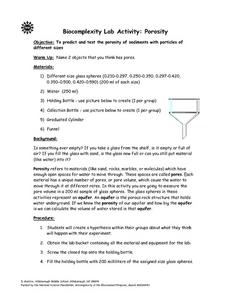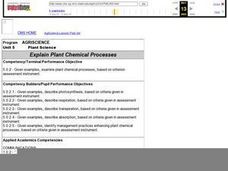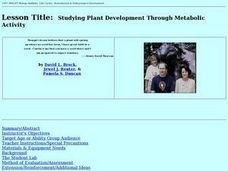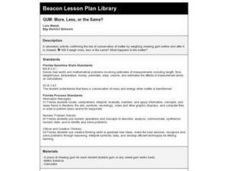Curated OER
The Relationship Between Salinity and the Density of Water
Students investigate density and salinity of water. For this density and salinity lesson plan, students find the density of objects and liquids and show the relationship between the salinity and density of water. Students add salt to...
Curated OER
Ecology of the Dump
Students determine which types of garbage are biodegradable and which are nonbiodegradable. They practice measuring skills, hypothesizing, taking data, and writing a lab report. Students observe the relative biodegradability of metal,...
Curated OER
Chemquest: Physical Changes or Chemical Reactions
Students explore physical and chemical changes. In this chemistry lesson plan, students will go outside to observe changes seen in nature. Students will then work in the lab to identify changes at different stations prior to doing a...
Curated OER
Building Polymer Cup Speakers
Students investigate sound waves and they build audio speakers. For this audio speakers and sound lesson, students explore how to make quality audio speakers. As a team they build their own speakers to have clarity in sound, quality in...
Curated OER
Density lab
Students relate the concept of density in relation to the rocks that make up the Earth. They determine the density of various rock specimens and answer assessment questions.
Curated OER
Testing Density of Various Soap Products
Students have the opportunity to observe, measure and analyze the density of aerosol shaving creams and foams generated from shampoo and dishwashing liquids or detergents.
Curated OER
Getting Familiar with Fractals
Students use the Internet to answer lab questions about fractals, and then construct fractals using the initial stage and iteration rule. They complete tables and generate rules for the "nth" term and create their own fractals.
Curated OER
Comparing the Density of Iron
Students use scientific measuring tools to collect and use scientific data. They determine the density of four different objects by using their data to explain why objects have similar/different densities even though they are both made...
Curated OER
Porosity
Young scholars predict and test the porosity of sediments with particles of different sizes. They name two objects that they think has pores. Students define the term porosity and pores. They comprehend that an aquifer is the porous...
Curated OER
How Large is a Mole of M&M's
Students calculate whether or not a mole of M&M's fill their high school. They practice factor-labeling, define a mole, and calculate the number of cubic feet per mole of M&M's. To answer the question they measure and calculate...
Curated OER
Density and Buoyancy Lesson Plan
Learners investigate why some objects float or sink in water. In this physics instructional activity, students calculate the density of clay ball using a mathematical equation. They write a complete lab report about the experiment.
Curated OER
Icebergs Ahead!
Students examine icebergs and how they are suspended in water, why ice floats, the melting process of an iceberg, and the floating behavior of ice compared to that of a cork through a lab activity.
Curated OER
Ice Cream Blizzards
Fourth graders explore whether the making of homemade ice cream is a physical change or a chemical change in a lab experiment. Students identify states of matter, describe the physical properties of states, and collect temperature data...
Curated OER
Explain Plant Chemical Processes
Students discover plant chemical processes through three lab activities. Overheads, data sheets, and teaching procedures provided for the unit covering photosynthesis, respiration, and transpiration.
Curated OER
Pendulum Activity
Fourth graders conduct a lab activity that measures the factors that change the swing rate of a pendulum. They create a hypothesis and test it during the experiment. They record their observations using the recording sheets and journal...
Curated OER
Finding Mass
Student measure mass to discover how pennies have changed in their composition. In this measurement instructional activity, 8th graders investigate through an open-ended problem to discover how the US pennies composition changed in the...
Curated OER
Human Body Explorations
Students examine genetics and the DNA of a kiwi. For this DNA lesson students complete a lab to extract DNA and interpret their results.
Curated OER
Studying Plant Development Through Metabolic Activity
A hands-on activity which allows students to learn about cellular respiration. This lesson contains a range of investigations testing the rates of cellular respiration to demonstrate the relationship between metabolic rates of...
Curated OER
Micropipette and the Metric System
Students practice measuring the correct volume using micropipette. In this biology lesson, students determine the correct micropipette tip to use when transferring fluid. They convert metric volume from one unit to another.
Curated OER
GUM: More, Less, or the Same?
Pupils confirm the law of conservation of matter by weighing chewing gum before and after it is chewed.
Curated OER
Viscosity and Density
In this viscosity and density pre-lab worksheet, students define these two terms and determine how to find relative viscosity and the volume of an irregular shaped solid. This worksheet has 13 short answer questions.
Curated OER
Nature's Air Conditioner
Young scholars observe the process of transpiration in leaves. They measure how much water a leaf gives off in a 24-hour period, calculate the volume, and answer discussion questions.
Curated OER
DNA Isolation from Onion
Students apply measurement skills using the metric system. They explain the process of isolating DNA from other cell contents. They apply knowledge of cell structure to explain the process of isolating DNA.
Curated OER
Estimating the Live Mass of Dinosaurs
Students estimate the live mass of dinosaurs. Using dinosaur and modern animal models, students use simple displacement methods to calculate the volume of the models. They calculate the masses of each model. Students compare the...

























